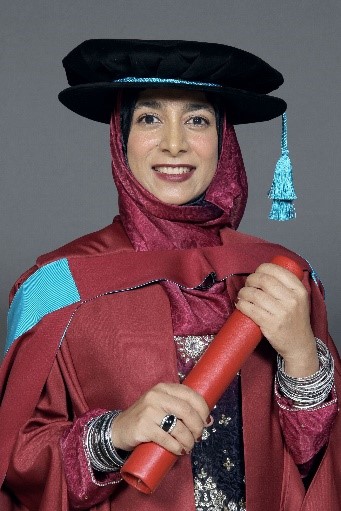SAMRC’s ‘Early Investigators Programme’ beneficiary shines a light on rare diseases

Associate Professor Shahida Moosa's dedication to improving the lives of patients with rare genetic conditions has earned her recognition both in South Africa and on a global stage. Prof Moosa has received the John M. Opitz Young Investigator Award from the American Journal of Medical Genetics. She is funded by the South African Medical Research Council’s (SAMRC) Division of Research Capacity Development (RCD) under the Early Investigators Programme (EIP). Her research programme focuses on undiagnosed diseases in South Africa. Her work illuminates the path to a brighter future for countless patients and families in Africa. In this article, she shares the pivotal role played by the SAMRC's RCD funding programme in her career and research.
Prof Moosa's interest in medical genetics began during her paediatrics training, where she encountered patients with genetic conditions. She became the first primary specialist in medical genetics to register with the Health Professions Council of South Africa after four years as a registrar. Passionate about helping patients with rare genetic conditions, she pursued her PhD and advanced training in genomic techniques and bioinformatics in Germany at the University of Cologne. After postdoctoral training in the USA at Harvard Medical School and Boston Children's Hospital, she returned to South Africa and established the "Rare Disease Genomics in South Africa" research group at Stellenbosch University’s Faculty of Medicine and Health Sciences.
Prof Moosa launched the Undiagnosed Disease Programme (UDP) in 2021 to provide diagnoses for rare diseases. The SAMRC-EIP supported the initiative from 2022, enabling the pioneering of clinical genomics and bioinformatics in Southern Africa. The programme has provided hope and empowerment to hundreds of families and patients. Prof Moosa and her research group also engage in patient advocacy, raising awareness of rare diseases, and facilitating access to specialised housing and schools for disabled patients.
Prof Moosa has made significant contributions to the field of medical genetics and was awarded the John M. Opitz Young Investigator Award in 2023 for her groundbreaking research on the UDP. Her research group has published 13 papers with a further four in revision and graduated six students cum laude (four MSc (Human Genetics), one MPhil and one BSc (Hons). In 2022, she became the youngest Head of Medical Genetics at Tygerberg Hospital. She also serves as a Section Editor for the European Journal of Human Genetics and the American Journal of Medical Genetics Part A.
Prof Moosa and her team have successfully used genomic technology in Sub-Saharan Africa, highlighting its potential for wider adoption. They aim to expand the UDP's reach, transition from diagnosis to gene discovery, and improve newborn care through rapid testing in Intensive Care Units.
As the only medical geneticist in South Africa with an NRF C2 rating, Prof Moosa's career trajectory serves as an inspiration to aspiring researchers, particularly women and underrepresented minorities. Her advice to future candidates and students is to “Set lofty goals, believe in oneself, and be brave in the face of challenges.”
Dr Abeda Dawood, Division Manager at RCD, comments on this exceptional researcher saying, “Prof Shahida Moosa's journey in Genomic Medicine, supported by the newly initiated SAMRC's Early Investigators Programme, has not only transformed her career but also brought hope and answers to countless families in South Africa. Her dedication to pushing the boundaries of medical science serves as a shining example of the positive impact research can have on society, particularly in the realm of rare diseases.”
